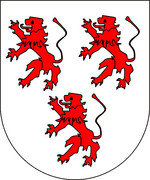Prince-Archbishop of Cambrai
|
Archdiocese of Cambrai Archidioecesis Cameracensis Archidiocèse de Cambrai |
|
|---|---|

|
|
| Location | |
| Country | |
| Ecclesiastical province | Lille |
| Metropolitan | Archdiocese of Lille |
| Statistics | |
| Area | 3,420 km2 (1,320 sq mi) |
| Population - Total - Catholics |
(as of 2013) 1,020,000 921,900 (90.4%) |
| Information | |
| Denomination | Roman Catholic |
| Sui iuris church | Latin Church |
| Rite | Roman Rite |
| Established | 580 |
| Cathedral | Cathedral of Our Lady of Graces in Cambrai |
| Patron saint | Saint Gaugericus of Cambrai |
| Current leadership | |
| Pope | Francis |
| Archbishop | François Charles Garnier |
| Metropolitan Archbishop | Laurent Ulrich |
| Map | |
 |
|
| Website | |
| Website of the Diocese | |
The Roman Catholic Archdiocese of Cambrai (Latin: Archdiocesis Cameracensis; French: Archidiocèse de Cambrai) is an archdiocese of the Latin Rite of the Roman Catholic Church in France, comprising the arrondissements of Avesnes-sur-Helpe, Cambrai, Douai, and Valenciennes within the département of Nord, in the region of Nord-Pas-de-Calais. The current archbishop is François Charles Garnier, appointed in December 2000. Since 2002 the archdiocese has been a suffragan of the Archdiocese of Lille, returning to the prior arrangement.
Originally erected in the late 6th century as the Diocese of Cambrai, when the episcopal see after the death of the Frankish bishop Saint Vedast (Vaast) was relocated here from Arras. Though subordinate to the Archdiocese of Reims, Cambrai's jurisdiction was immense and included even Brussels and Antwerp.
In the early Middle Ages the Diocese of Cambrai was included in that part of Lotharingia which at first had been allocated to the West Frankish king Charles the Bald by the Treaty of Meerssen of 870 but, after various vicissitudes, came under the rule of the German king Henry the Fowler in 925. After the revolt by Duke Gilbert of Lorraine collapsed at the Battle of Andernach of 939, Louis IV of France renounced the Lotharingian lands, and in 941 Henry's son and successor King Otto I of Germany ratified all the privileges that had been accorded to the Bishops of Cambrai by the Frankish rulers.
...
Wikipedia
